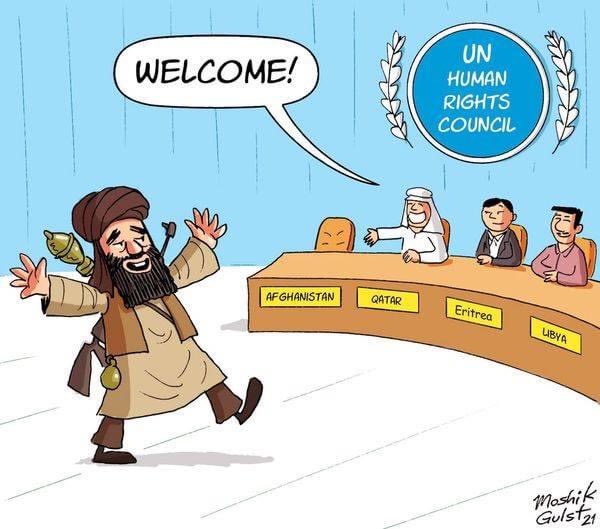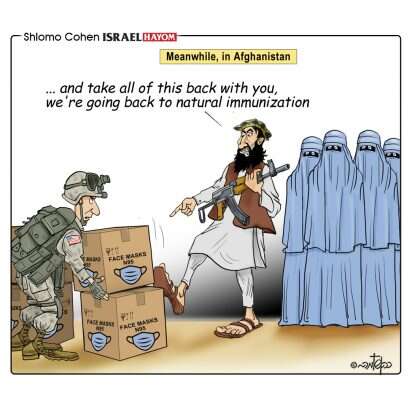After American withdrawal from Afghanistan, implications for Israel look grimmer
As Israel observes the fall of Afghanistan to the Taliban, it’s difficult to forget the capitulation of the Iraqi army to ISIS in 2014 or the EUBAM observers who fled as Hamas seized power in the Gaza Strip in 2007, not to mention visions of the United States fleeing Saigon in the spring of 1975 as part of the collapse of the Vietnam War.Noah Rothman: The Magical, Self-Justifying Afghanistan Debacle
Noting the coincidental, yet equal number of years separating each of the Middle Eastern incidents in which Islamic fundamentalists defeated their adversaries, Eran Lerman, vice president of the Jerusalem Institute for Strategy and Security, half-jokingly called it the “seven-year-itch.”
“What worries me,” he says, “is a much broader symbolic message that Islamist radicalism is once again on the march, the Americans have no staying power, and the West is in decline.”
Lerman suggests that Israel learn lessons from the past, saying it should “band together with other countries to hold against the tide.”
Referring to Israel’s own concerns of Islamic fundamentalists taking over Palestinian areas besides Gaza, which Hamas already controls, Lerman says “I hope we never again hear lectures from the Americans on how you can trust Palestinian security forces to run their country and keep us safe once we leave.”
Israel has long argued that a future Palestinian state left to its own devices and without Israeli oversight would easily collapse if confronted by a terrorist organization like the Islamic State (ISIS), the Taliban or Hamas.
The fall of Afghanistan only strengthens Israel’s argument and, as Lerman argues, its leaders must learn the lessons here.
Having finally extricated itself from the mire that is Afghanistan—a goal shared by the previous two U.S. administrations, one Democrat- and one Republican-led—America has simultaneously sent a dark and ominous signal suggesting to its allies that it is no longer reliable, especially since it grossly underestimated the speed at which the Taliban took control.
On Monday, President Joe Biden delivered what could only have been a hastily prepared speech on the meltdown in Afghanistan before resuming his vacation. In it, the president abandoned his rationale for total U.S. withdrawal which, in July, was predicated on the competence, training, and numerical strength of the Afghan National Forces. This week, Biden insisted, withdrawal was justified by the abject weakness and cowardice of those very same Afghan soldiers.Netanyahu: In 2013, John Kerry Offered Israel to Adopt ‘Afghanistan Model’ with PA
“American troops cannot and should not be fighting in a war and dying in a war that Afghan forces are not willing to fight for themselves,” Biden insisted. “We gave them every chance to determine their own future. What we could not provide them was the will to fight for that future.” This sentiment must have appealed to Democrats like Sen. Chris Murphy, who took the opportunity of Afghanistan’s collapse to insist that the lesson here is that we should abandon the pursuit of America’s long-term interests in favor of applying Band-Aids to threats as they arise. Presumably, the rest of Joe Biden’s party will see the virtue of this sort of projection soon enough.
Leaving aside for a moment that running down an ally—even one we’ve summarily abandoned to the mercies of an Islamist militia—is an odd way to restore American credibility on the world stage, Biden’s exercise in blame-shifting has the added defect of being untrue. Tens of thousands of Afghan soldiers fought and died in defense of their country since NATO-led combat operations ended in 2014. They continued to do so well into 2020, when American “peace talks” with the Taliban began to sap those soldiers of the “will to fight” with the understanding that U.S. support was winding down. And when Biden pulled the plug on “air support, intelligence, and contractors servicing Afghanistan’s planes and helicopters,” a thorough Wall Street Journal expose revealed, “the Afghan military simply couldn’t operate anymore.” The Afghans didn’t lose the will to fight for their country; they were robbed of the means of effectively doing so by Washington.
The audience for President Biden’s self-soothing talk about the inevitability of Afghanistan’s implosion isn’t limited to stunned Democrats. A certain sort of conservative for whom retrenchment is both a means to an end and an end in itself is just as enamored of this dubious talking point.
The former prime minister revealed Wednesday that in 2013, he was approached by then US Secretary of State John Kerry, who invited him on a secret visit to Afghanistan to see, as he explained, how the US had set up a local military force that could stand alone against terrorism.
“The message was clear – the ‘Afghanistan model’ is the model that the United States seeks to apply to the Palestinian issue as well,” he wrote.
He “politely declined” the offer and rejected the idea.
“I estimated then that as soon as the US left Afghanistan, everything would collapse. This is unfortunately what has happened these days: an extremist Islamic regime has conquered Afghanistan and will turn it into a state of terror that will endanger world peace,” he said.
“We will get the same result if we hand over swaths of land to the Palestinians. The Palestinians will not establish Singapore. They will establish a state of terror in Judea and Samaria, a short distance from Ben Gurion Airport, Tel Aviv, Kfar Saba and Netanya,” he warned.
Meanwhile, Afghanistan is now under full Taliban control after the fall of Kabul, as US forces and Western diplomats are fleeing the capital’s airport.
He further cautioned that “we saw the same wrong policy with regard to Iran. The international community has embarked on a dangerous agreement that would have given Iran an internationally condoned arsenal of nuclear bombs meant for our destruction.”
“I was then asked by our friends to keep quiet. Do not act or fight. I did not agree to that either. We have pursued an attack policy both in the operational field and in the diplomatic and explanatory field. I went out against the whole world, including many in Israel, and spoke in the US Congress against this dangerous agreement,” he recounted.
🇺🇸 Ambassador Linda Thomas-Greenfield says U.S. expressed "in no uncertain terms" at the United Nations through "a very strongly worded press statement" from the Security Council that "we expect the Taliban to respect women's rights" and "to be respectful of humanitarian law." pic.twitter.com/32TEyRFu4O
— Hillel Neuer (@HillelNeuer) August 18, 2021









































